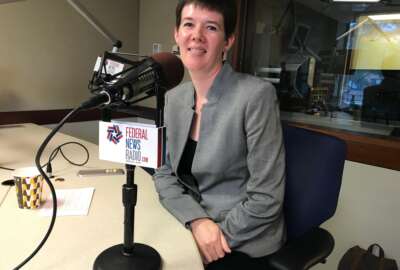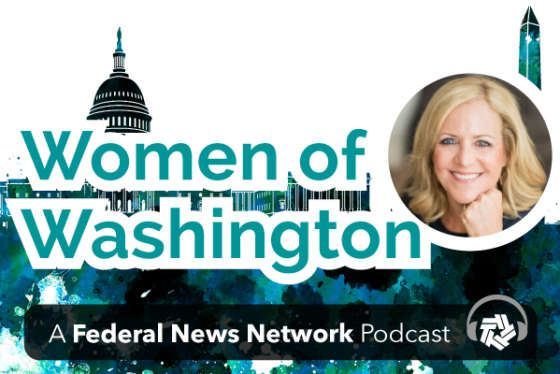Best listening experience is on Chrome, Firefox or Safari. Subscribe to Women of Washington’s audio interviews on Apple Podcasts or PodcastOne.
On this episode of Women of Washington, Gigi Schumm welcomed Rachel McCaffrey, executive director of Women in Defense, an affiliate of the National Defense Industrial Association. Before WID, McCaffrey served 28 years in the Air Force, retiring in 2017 as a colonel.
Women in Defense is a nonprofit business focused on education with two primary goals. The first goal is to help women who already work in the defense and foreign policy sectors who may need assistance in achieving their career goals. The second is providing outreach and building the workforce, with 20 chapters across the United States.
“The women who are part of those chapters are very interested in outreach to women as young as elementary school and then in middle school and high school,” McCaffrey said. “Fifteen of the chapters have scholarship programs for women in college and it’s to encourage women to consider careers in the defense industry with a particular focus on science, technology, engineering and math.”
While the nonprofit is focused on women helping women to succeed, McCaffrey said they still embrace the advocacy of men in the industry. In their national conference in June, WID welcomed Adm. John Richardson, the chief of naval operations, as its keynote speaker.
WID was formed by two women in 1979. McCaffrey said they made sure to label it as a national security organization because they didn’t want it to be seen a social organization. During that time, it was difficult for women in the industry, especially engineers, to find other women who shared the same experiences.
“Our focus is on professional development… and how do we encourage diversity and inclusion throughout the defense space,” she said. “Because all the research shows that diverse groups make better decisions.”
Challenges women face
Women have come a long way in government since the 1970s, but there are still some barriers that limit their success.
McCaffrey, referencing an Hewlett Packard study from a 2014 Atlantic article, said men were more likely to apply for job promotions even if they didn’t meet all of the criteria. She said that lack of self-confidence in a women means she is not giving people an opportunity to say yes — or no — and that makes it harder to figure out what would give her a more competitive edge.
But there are also barriers for women who are more assertive.
“They found that sometimes when you’re a woman and you do have that confidence… that sometimes that turns people off too because you don’t fit the stereotype of a quiet woman just sitting back and waiting for other people to tell her what to do,” McCaffrey said.
She said as WID continues to grow, and they hold more conferences, they will focus on providing transition planning and professional development tips and techniques for women in the defense industry and Armed Services.
McCaffrey said that during the first WID national conference last year, she posed a question to one of the panel members: Do you think you could be CEO of the company you work for? After answering the question, the woman asked 20 of her friends from different sectors the same question.
Most said “no”, not because they didn’t have confidence, but because they would have to give up other things in their lives.
Education
McCaffrey grew up in central Massachusetts with three younger sisters. She said her father really wanted a son, but when that didn’t happen, he decided she would be the sports fan. She’s a football and baseball fan, following the Boston Red Sox regularly.
And despite being so far away, she is still close to her sisters.
“They’re my best friends,.” She said “So I try to talk to them every week. My vacation time is usually spent with my sisters.”
She attended the University of Notre Dame in Indiana on an electrical engineering scholarship from the Air Force ROTC program she was in during high school. However, she realized as she received low marks that she wanted to do something else. So she dropped the scholarship, and decided to pursue English literature instead, and minor in computer applications (coding).
Later on she received a non-tech scholarship from the Air Force during a difficult time.
“I was told I was the only person in the country to get a two-year non-tech scholarship the year that I got it,” McCaffrey said. “Sometimes you get very fortunate. You work hard, you try to do the right thing for the right reason. So I knew I was going to go into the Air Force because the only thing I’ve ever wanted to do since I was 12 years old was be an officer in the military.”
She said she wanted to prove to herself that she could be a great leader. Education teaches you stuff, yes, but it also forces you to think. From there, you can make choices.
Work-life balance, a myth
Life is all about prioritization, and making those choices, she said.
“I personally think this idea of work-life balance is a myth. There are going to be times when you’re going to prioritize your family over your job, and times when you prioritize your job over your family. Sometimes your priority is going to be getting to the grocery store before it closes at the end of the day,” McCaffrey said. “At different times in your life, things are prioritized differently.”
Priorities change between ranks within military or government. McCaffrey said making sure everyone in your life has a seat at the table is what’s important. Everyone, whether a high-ranking official or a civilian, has to make tough decisions. That’s what life is about.
She said one decision she wishes she would have made was to continue coding, as it would have been helpful in her career outside of the military.
“When you’re in the military, you know everything there is to know about the military, but you really don’t know very much about what’s on the outside or what you’re going to do when you leave,” she said. “You don’t know what you don’t know and that can become very scary for people.”
Advice for her younger self? Be open to opportunity. Don’t be afraid to try new things.
Copyright
© 2024 Federal News Network. All rights reserved. This website is not intended for users located within the European Economic Area.

